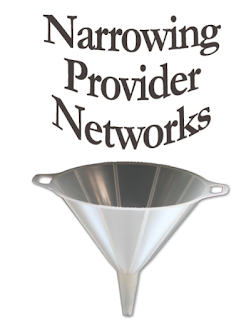One community that the Affordable Care Act ("ACA") has served particularly well is people living with HIV/AIDS. The law has led to the elimination of pre-existing condition barriers, lifetime limits on the amounts insurers have to pay, and the prescription drug “donut hole” under Medicare Part D, to name only a few. Expanded screening for HIV-infection is also an important feature of the law. That said, new barriers now face many people living with HIV/AIDS trying to access care and treatment. Among the most troubling is insurance network narrowing.
The ADAP Advocacy Association hosted a roundtable discussion on the "Restricted Access to Care under Insurance Network Narrowing" in Birmingham, Alabama earlier this month. The practice of narrowing networks is a cost-savings tool utilized by insurers, but patients find fewer doctors and hospitals in their network...or pay more to use a provider of choice. The practice has taken on a life of its own under the ACA.[1]
 |
| Photo Source: California Broker |
The issue isn't going away, which is prompting advocates to combat it. The forum in Birmingham included an in-depth policy discussion on insurance network narrowing with the following panelists:
- David Poole, Legislative Affairs, AIDS Healthcare Foundation
- Wendi Clifton, President, WL Clifton Political Consulting
- John Dunnam, Positive Leadership Council, AIDS Alabama
- William Arnold, President & CEO, Community Access National Network
 |
| L-R: B. Arnold, J. Dunnam, W. Clifton, and D. Poole |
For example, Grady Health System in Georgia provides over $200 million in indigent care because over half the population experience insurance-related barriers. This figure is problematic for people living with HIV/AIDS considering that the Peach State is one of the leading states in new HIV infections.
Patients in Florida are experiencing similar challenges, too. Summarized David Poole, Director of Legislative Affairs for AIDS Healthcare Foundation, "Narrow networks are forcing Floridians to access providers who they do not know, do not have an existing trusting relationship and often times are not experienced as HIV providers. The treatments have become highly effective and are much more simple regimens but the disease state remains very complex."
Patients in Florida are experiencing similar challenges, too. Summarized David Poole, Director of Legislative Affairs for AIDS Healthcare Foundation, "Narrow networks are forcing Floridians to access providers who they do not know, do not have an existing trusting relationship and often times are not experienced as HIV providers. The treatments have become highly effective and are much more simple regimens but the disease state remains very complex."
The problem with insurance network narrowing is compounded by the "balance billing" practice by insurers. Healthcare.gov characterizes balance billing as, "When a provider bills you for the difference between the provider’s charge and the allowed amount."[2]
(Editor's Note: Additional barriers to care and treatment were outlined in our previous blog, "Future of ADAP in Medicaid Non-Expansion States")
As the ACA continues to unfold, growing pains will certainly remain and none probably more frustrating than insurance network narrowing. People living with HIV/AIDS -- just like any patient -- should be afforded the opportunity to visit the provider of their choice, especially for specialty services such as infectious disease care and treatment.
The ADAP Regional Summit in Birmingham, Alabama was held in partnership with the AIDS Alabama, AIDS Healthcare Foundation (AHF) and the Community Access National Network (CANN). To learn more, visit http://adapadvocacyassociation.org/events.html#arsba.
____________
[1] Ableson, Reed, The New York Times, "More Insured, but the Choices Are Narrowing,"May 12, 2014; last viewed online at http://www.nytimes.com/2014/05/13/business/more-insured-but-the-choices-are-narrowing.html?_r=0.
[2] Healthcare.gov, "Balance Billing,"
No comments:
Post a Comment